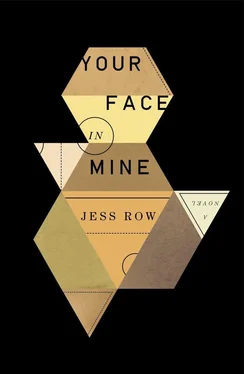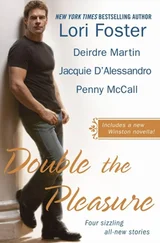My mother — she was a devotee from the beginning. Sat at Beneficent’s feet, transcribed his talks from reel-to-reel tapes, mimeographed the newsletters. Her name was Katherine; she never told anyone her last name. Straight up refused. It’s not even on my birth certificate: Katherine Doe. Like a nun. A bride of Christ. And here’s the thing: ordinarily that would just mean she was the guru’s secret girlfriend, but Beneficent was celibate, actually celibate; he believed women were serpents, channels of sin. On the other hand, he was a student of religious history. Think of the cults that proscribed sex: the Essenes, the Gnostics, the Shakers. Self-erasing. He understood the value of procreation, but his compromise was to make it impersonal and assigned, and my parents were his experimental model. Dad already knew he was gay. And Katherine never wanted children. To say the least. Dad used to say I was a product of pure faith. A prototype.
And Dad? He was a fairy. A flaming queen of the first order. I mean, look, I suppose he could have disavowed me outright. He could have given me up for adoption or abandoned me. He did his duty, but that doesn’t mean he was what I would call a family-oriented person. I had to pry the details out of him with a crowbar, and that was just before he died, when he was too weak to resist and I was the one feeding him Ensure through a straw. But the thing about me, the distinguishing feature, you could say, is that I never really cared that much about my genes. Past a certain point. To me it’s the absence that makes the difference. I had the lightest dusting of mothering one could ever imagine. Ostensibly the reason was that after Beneficent’s death she was completely shattered, and she spent my first few years in and out of a catatonic depression. It doesn’t really matter. Somehow I was kept clothed and fed and sane. There were other women around, though I don’t remember them, either. Shortly after she left, we left and moved into Baltimore. Big Love was sold; my father got some of the money. I was never quite certain how that went down. He had already finished his Ph.D. at Hopkins — Russian history. And was kept on as a lecturer for a few years. Then somehow, I don’t know exactly, he moved into being a librarian. And that’s what he was, for life. The Slavic languages librarian. Which is like being the priest of some obscure religion no one actually practices. For some reason you’re kept on. You’re a relic, but a relic with a continually renewed contract. I mean, this was the tail end of the Cold War. Russian studies was going the way of the LP record. Who would be in there looking for volume thirty of Mayakovsky’s collected works? But universities are like that, right? I mean, what is a university, otherwise, than a kind of giant pack-rat collection, betting that all this stuff is one day going to be useful?
So that was his life. It didn’t pay much, but what did that matter? Our house was practically free. It was a dump when we bought it, not much more than a shell. Enrique rebuilt it from the ground up. That was Dad’s boyfriend, his first one. They really made a go of it, too: seven years. These days they might have been married. As it was, he didn’t even live with us — not officially. Dad was afraid the neighbors would object, or at least that’s the excuse he gave. None of the boyfriends ever lived in his bed. They were always bickering about toothbrushes and borrowed underwear. It was all part of his generalized paranoia, and of course that’s why none of them stayed, in the long term.
Paranoia. That was his native condition, his MO, even before he got sick. I’ve never met a person who could read more into less. He’s stopped using my shampoo. That kind of thing. Maybe he’s washing his hair at someone else’s house. At work he had two officemates, Janice and Philip — the three of them must have worked together for fifteen years — and I don’t think they ever stopped fighting. Not one day. He would come home in tears because Janice refused to water his Virginia creeper. That bitch has the blood of my plants on her hands. It was all theater, only sometimes not. And as a child, how could I tell the difference? I thought grown-ups were that way. I looked forward to the day I could use foundation and Pond’s Cold Cream.
This house we had, this house Enrique built for us, for my dad’s specific requirements, had no windows to speak of. It was a row house, of course, but the front window, too, was blocked off; there was this huge built-in bookshelf there instead. You had to have the lights on twenty-four hours a day. I had a window, in my bedroom, the front bedroom, upstairs. But Dad’s were covered with velvet drapes, always closed. I’m not kidding. It was cliché piled on cliché. Richard Simmons on TV? Remember him? For a while I thought we had to be related to him. There was no one else I could imagine. This was in the Eighties, after all. No gay men in wide circulation. No Nathan Lane, no Will and Grace. And apart from boyfriends, Dad had no friends to speak of. No meals on Friday nights, no Thanksgivings, nothing. If you want one fact about my childhood that matters, there it is: I was alone. But it’s too easy to say that. Those words are meaningless, really. There’s no adult language for what it means to be alone as a child. Those first years in Baltimore — it was like I was the only child on earth.
Shabazz. I went to El-Hajj Malik El-Shabazz Elementary. I was the first white kid to enroll there in eight years, since they’d changed the name from Paul Revere. Too much, isn’t it? But here’s the thing: all those horror stories, those urban-pioneer, reverse-gentrification stories, the white kids getting picked on, beat up, you know the drill, none of that happened to me. I wasn’t a curiosity, I was a nonentity. I was invisible. Even my teachers hardly remembered I was there. I always sat at the back, I paid attention, I did all the worksheets on time, and in between, when the fights happened, when someone threw a chair through a window, or broke another kid’s nose, or whipped out a box cutter, I took cover, mostly. There were always a few of us at the back taking shelter; sometimes we turned the desks over and made ourselves a little foxhole. At lunchtime we hid in the cloakroom or in the bathroom stalls. Those were my friends. The hiders. This was the Eighties; there weren’t police in the schools yet. No metal detectors, no security checking bags at the door. And the school itself was new — new carpets, new paint on the walls, new lockers. But no windows. That was my daily migration, from one cave to another. And you know what? I didn’t hate it, at the time. I had no grounds for comparison; I made a life out of it. Frankly, I was glad to be out of the house. I’d never been to school before I entered the first grade at Shabazz. I’d learned to read — somehow I’d always been able to read. I could add and subtract. But I’d never played with a basketball before. I’d never had a lollipop. Never listened to Michael Jackson. For better or worse, that was my gateway into the world. And then, lo and behold! I had a friend. William Thurgood Marshall Hayes. Willie.
As I said — you have to always bear this in mind — I wasn’t a threat. I wasn’t a symbol of anything, at least not as far as six-year-olds were concerned. In that place, at that time, I was simply odd. Willie kept saying, You’ll grow out of it. That was his theory. Eventually, he said, your hair will fall out and grow back, you’ll get darker, you’ll be just like the rest of us. Small kids anticipate everything adults will ever imagine. Isn’t that what Picasso said, return me to the mental world I had when I was five?
Willie was the best. A little kid, like me, small for his age. Small and wily. His father was a wrestling coach at Dunbar; he had a practice mat in the basement and used to put us through self-defense drills. How to get hit. How to fall. Arm blocks and pressure points. To give us inspiration he let us watch Enter the Dragon and Kung Fu Action Theater. God, we spent hours down there, eating Cheetos and pretending to be Bruce Lee. Willie had two older sisters, much older, teenagers, and they ran an unlicensed hair salon with his mom in the back of the house. His mother was half Cape Verdean, and that was the food they ate. Cachupa. Jagacida. Canja. Canja, especially. It’s a thick chicken soup — thickened with rice, like avgolemono. Almost like a porridge. The world’s best comfort food. Robin learned how to make it. It was either that or keep making pilgrimages to New England. No Verdean restaurants around here. Anyway.
Читать дальше












